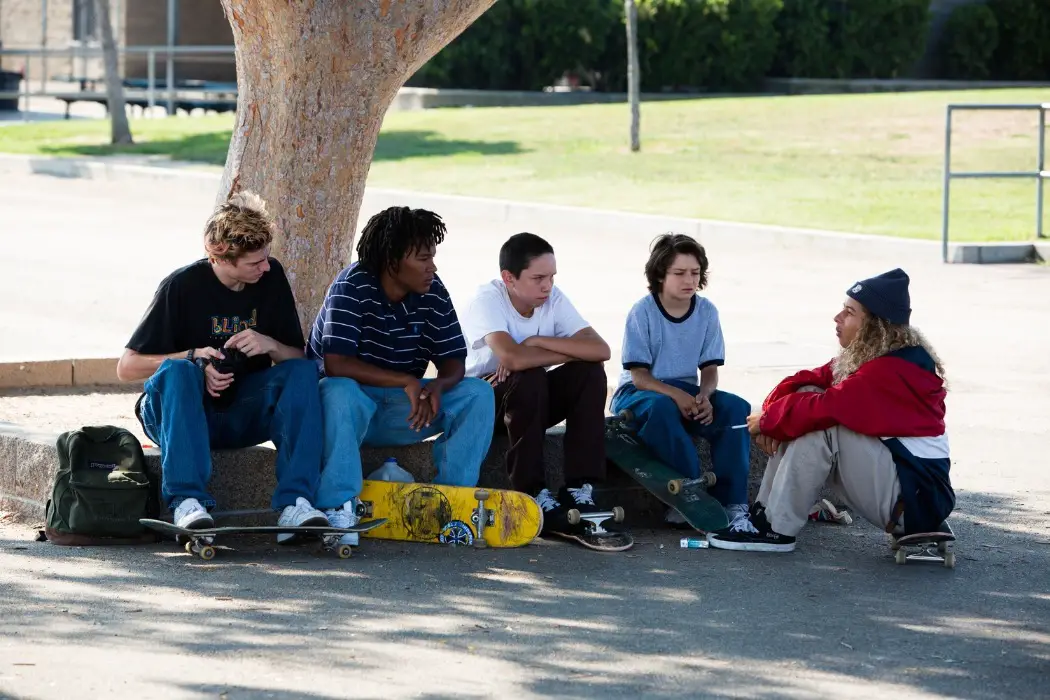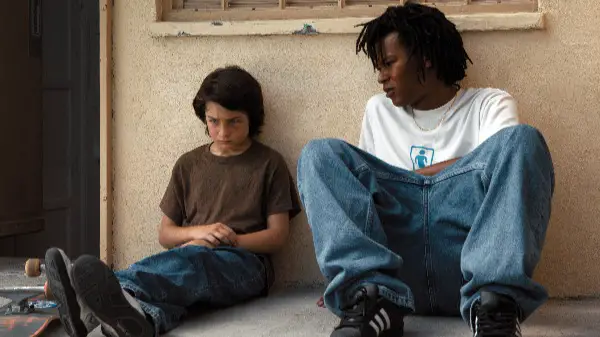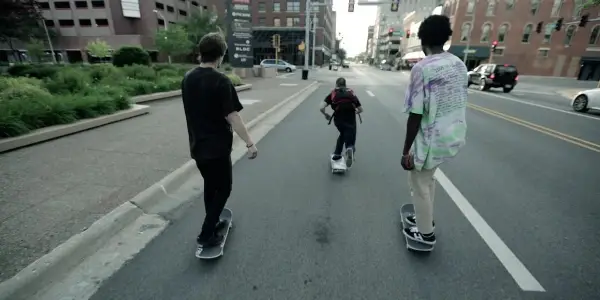Kickflips And Catharsis: mid90s & Skateboarding On Screen

Connoisseur of cereals, advocate of annoying alliterative attempts to attract…
“That’s why we ride a piece of wood” proclaims a Californian teen in Jonah Hill’s slice of grainy 16mm nostalgia, mid90s; “like, what that does to somebody’s spirit”. Although the character, affectionately known as ‘Fuckshit’, is hardly the Tony Hawk of spiritual musing — his musings often concern spirits of a much harder variety — it’s a notion that, certainly on the big screen, appears to land successfully.
Debuts and Documentaries
Hill’s film, which rolled into UK cinemas on 12 April, stars Sunny Suljic (The Killing of a Sacred Deer) as a thirteen-year-old boy who befriends a group of older skateboarders against the backdrop of ‘90s Los Angeles. Having made no secret of his passion for writing and directing in the past, this coming-of-age tale — which also stars Lucas Hedges and Katherine Waterston amidst a cast of relative newcomers — marks a watershed moment in Hill’s own career.
An authentic and understated directorial debut — if somewhat lacking in depth — mid90s continues something of recent renaissance in skateboard-themed movies. September 2018 saw the archetypal image of foul-mouthed, snap-back-clad boys and their boards refreshingly one-eightied in Crystal Moselle’s Skate Kitchen — a charming, touching drama about an all-female skate group. And, after its UK release last month, mid90s comes hot on the (w)heels of another skateboarding odyssey: Bing Liu’s startling documentary Minding the Gap.

Over the course of several years, Liu — just like another character in mid90s, coincidentally — captures the various rises and falls of his group of skateboarding-obsessed friends as they grind and ollie their way around the concrete jungle of urban American life. In much the same way we see his pals cut, crack and scrape their bodies in pursuit of the perfect pop-shuvit, Liu’s film is equally honest in the parallels it draws with the pain of what it means to be young. Scarring in more ways than one, it’s an astonishingly raw, intimate, timely ride, as three friends shoulder past trauma, grief and the increasing weight of responsibility while navigating their own search for identity.
Crucially, though, Minding the Gap never forgets one important truth: while the half-pipe of life has steep descents, it also has soaring highs. And, in the case of Liu, Moselle and Hill’s films, such heights share a common denominator: the skateboard.
In all three instances, the act of skateboarding, both literally and figuratively, offers an exhilarating escape. Putting polyurethane to tarmac curbs the anxiety of life, representing an empowering, if all-too fleeting moment of complete, unconditional freedom — one personified in the poetic picture of baggy-clothed teens meandering majestically down winding streets, silhouetted against the deep orange glow of sunset.
Pseudo Families
But, it’s a freedom that’s shared. A palpable sense of belonging is a mainstay of the skateboarding narrative, depicting outcasts finding solace in a group united by a deep-running, mutual passion. The dysfunctional domestic life of mid90s’ young protagonist Stevie (Suljic), one of friction and absence, is so far removed from the warmth and spontaneity of the surrogate family he finds on the street: their profanity-laden discussions about alcohol and incest, however trivial, present a poignant contrast to the frustration, detachment and deafening silence that defines his experiences at home.
These are ‘bros’ in every sense of the word, in whose comforting company Stevie gets an unfiltered education he wasn’t afforded before — “what’s Black people?” he asks early on — with first-hand lessons in drink, drugs and his own sexual awakening. If the boxing film and other sporting heavyweights of the silver screen provide a gritty cinematic metaphor for the jabs, blows and sucker-punches life throws, the skateboarding film embodies the joyous recklessness of growing up and the blissful rebellion of adolescence.
Minding the Gap digs a little deeper, however, embracing skateboarding as an engrained extension of existence. As the young men, including Liu himself, struggle to confront and process their own experiences, their boards similarly bear the scars of yesterday. They scuff, they split, they splinter: the result of both the quest for perfection and the aftermath of seething rage. This is more than simply liberation: it is a graceful, at times painful, exercise in purification, where, if only for a short while, gravity seemingly seeps away into weightlessness and gazes are forced firmly ahead, no longer behind. Just as it was for Dogtown’s pioneering Z-Boys in the empty swimming pools of sweltering ‘70s California, skateboarding is what makes them, them, and, more importantly, what keeps them, them.

Where this might lead them seems almost irrelevant. In fact, to expect a destination appears to miss the point entirely. After all, one doesn’t need roads to skate. Rather, such stories appear to embrace skateboarding as the giver of a rare gift: the precious sensation of living exclusively in a single moment.
As Liu’s film can attest to, life can jolt you every which way; but, with four wheels and a piece of wood beneath your sole — and embedded in your soul — the uncertainty of what might be around the corner suddenly feels a whole lot less daunting. To be able to do that to somebody’s spirit, skateboarding emits an ethereal power that cinema seems more than willing to get on board with.
mid90s was released in the UK on the 12 April 2019. Minding the Gap was released in the UK on 22nd March 2019.
https://youtu.be/X80JOq0lKCM
Does content like this matter to you?
Become a Member and support film journalism. Unlock access to all of Film Inquiry`s great articles. Join a community of like-minded readers who are passionate about cinema - get access to our private members Network, give back to independent filmmakers, and more.
Connoisseur of cereals, advocate of annoying alliterative attempts to attract attention, George pretends to know a thing or two about Film & Television. So much so, that he occasionally rustles up some barely-coherent sentences about it. But before you take his words as gospel, it’s probably worth knowing that he considers 13 Going On 30 to be this century’s underrated masterpiece.













